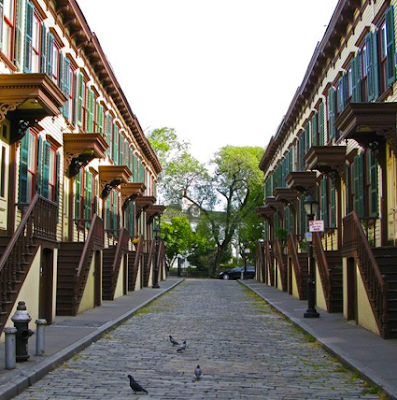Last summer, Newsweek
reported that researchers had identified an unnerving trend:
American childrens' scores on creativity tests (a la the Torrance Test) were, for the first time since they started being administered in the late 1950s, starting to drop. The article's authors, Po Bronson and Ashley Merryman, identified two likely factors in creating this downward turn, one being the increasing standardization of school curricula and the lack of deliberate creativity development in classrooms. Calling for a revival of such development, Bronson and Merryman wrote:
What’s common about successful programs is they alternate maximum divergent thinking with bouts of intense convergent thinking, through several stages. Real improvement doesn’t happen in a weekend workshop. But when applied to the everyday process of work or school, brain function improves.
I was struck the other day by a distinct echo of this statement in a
post by
LiftLAB collaborator Nicolas Nova about recent video games with which he'd been impressed. Writing about the game Superbrothers, Nova explains:
This combination of players’ interactions with “sound, music & audiovisual style” underpinned by a basic narrative and very low-key dialogues made me tick. More specifically, I am impressed by the rhythm of the game, which is sometimes super slow/contemplative and sometimes very quick/nervous in combat.
Bronson and Merryman's second major cause of the creativity slump in American kids was the increase in time spent plopped in front of the TV playing video games, but Nova's description of the rhythm and structure of Superbrothers highlights an interesting alternative:
video games are uniquely positioned to serve as vehicles for creativity development. Players engage in a video games with long-format storylines over extended periods of time. Many games have immersive environments that are fun to explore outside of plot-focused action (I'm thinking, here, of classic games from my youth like Chrono Trigger and Earthbound, though there are no doubt newer examples). This means that players alternate between different modes of thinking: slower, self-paced exploration (divergent) and goal-oriented tasks (convergent).
The digital worlds in which video games take place also require the suspension of disbelief, and we have all been pretty well-trained to oblige. Real people don't double in size when eating mushrooms, but while playing Super Mario Bros., few question that occurrence. In the aforementioned Earthbound, players battle everything from zombies and sea monsters to a possessed circus tent and Dali's clock (
no joke). When we're in gameplay mode, none of this seems out of the ordinary. We are ready to except non-traditional ways of thinking and, I'd argue, are primed to develop our own.
The good news for cities is that video games are increasingly being played on smaller and smaller screens. More recently, we've seen games that have begun to
incorporate real-world
geography, with episodic content that is tied to the exploration of actual places, as well as current events. Smartphones and handheld game consoles that make the original Gameboy look as technologically advanced a platform as a pencil and paper are increasingly ubiquitous, and they can be used to change the way that we see the world around us. The myriad public places that make up a neighborhood--parks, squares, streets, shops, libraries--could easily become 'levels' with various tasks assigned to them.
Using a Nintendo DS or a Droid phone, we could walk on a street we'd been down a thousand times and be prompted by a game to stop for the very first to look around and explore our surroundings. Designer Michael Wolff
describes the creative process as requiring three muscles that must be exercised regularly:
curiosity and
appreciation, which together enable
imagination. Video games already exercise the first two of these muscles; locating games within the context of a world that we recognize and understand allows them to encourage imagination that could actually improve the places in which those games are set.
As video games become tied to physical places (which has the added benefit, by the way, of getting players off the couch) the complexity of dense urban environments offers a distinct advantage:
New York's Union Square or Shanghai's Bund are the Xbox 360s to the suburbs' Atari.
According to one collective in Zagreb, "Augmented Reality promises to transform all points on the map into unlimited spaces that can be exploited for self-expression by anyone." In today's socially-oriented mashup culture, the rise of games that enable players not only to explore, but to impact their environment and share their interventions, as well as build on the creativity of players who came before them, seems inevitable.
Charles Landry wrote that “A creative city is a place where people feel they can fulfill themselves, there are opportunities. Things get done.” Video games offer plenty of opportunities to get things done and obtain a sense of fulfillment; location-based games that are designed to develop players' creative faculties present an opportunity to create a truly symbiotic relationship, developing inventive populations while simultaneously enriching the gaming experience. Leisure is important in any urban environment--and there's no reason that it can't be used to build a city up.







